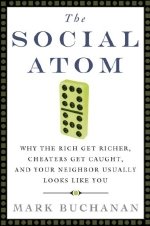The advantage of science over ideology is that science (when it's done well) aims to learn and accept the facts, however uncomfortable they may be. You may want the universe to be infinite, or finite, finite with sharp edges or finite but unbounded (like the surface of a sphere), or something else entirely different, but ultimately your desires won't change anything. Really good scientists have the ability to question their own preconceptions, and adjust their beliefs in the light of new facts. As Nietzsche once said, it's not so hard to have the courage of one's convictions; much more difficult is to have the courage to question one's own convictions.
I noticed today that the NYT's David Brooks cited a recent paper from MIT economists Xavier Gabaix and Augustin Landier on the matter of CEO pay in the U.S. However much I find Brooks' views frequently irritating, and while I strongly suspect he cites this work because it supports his natural affinity for hard-boiled capitalism, this particular citation does seems wholly appropriate -- for Gabaix's work, at least what I know of it, is based strongly on careful science.
What the paper claims is that the six-fold rise in CEO pay over the past two decades cannot easily be attributed to a culture of runaway greed or any other insidious evolution of corporate management. Rather, it seems that relatively straightforward economic factors -- essentially the competition between firms for good decision makers -- may well explain the rise. Over the same two decades, the authors point out, the size (capitalization) of the largest U.S. firms has also gone up by a factor of six. CEO's make so much more now, the argument goes, not because of stock options, or managerial "skimming" of corporate profits, but because their actions influence enormously larger sums of money -- and small but real differences in their abilities count for a lot.
This is very much traditional "neoclassical" economics, but their argument, in more detail, seems strongly plausible. They assume that firms compete for CEO talent, and that talent naturally becomes increasingly important in larger firms with more assets at stake. Mathematically, this leads to the prediction that larger firms should have more highly paid executives, which is empirically true. (CEO pay rises in a regular way as firm size (capitalization, earnings, number of employees) raised to the 1/3rd power.) It also predicts that CEO pay on average across the largest firms should rise in direct proportion to the average size of those firms -- not actually a startling conclusion, when you begin thinking this way.
But there's one other interesting thing in this work. Gabaix and Landier use their theory, and the data on compensation, to make an estimate on the distribution of talent among CEOs. What they find is that over the top CEOs, say the top 1,000, the variation in talent is almost zero. Taking the very best CEO and replacing him or her with the 1,000th best, would tend to decrease a firm's earnings by only 0.04% -- less than one part in 1,000. BUT -- because the largest firms are so large, and have so many assets, this tiny change can have major monetary consequences. So it makes sense, from a strictly economic point of view, for CEO number 1 to make a lot more than CEO number 1,000 even though their skills are essentially equal.
Of course, none of this says anything about the kinds of effects that gross economic inequality, stirred up by such enormous pay differences, may have on the larger community. That's another story. But what is clearly so nice about this work, at least in my opinion, is that it offers such a natural and non-conspiratorial explanation by making a direct appeal to real data. We could do with more of that.
Showing posts with label wealth. Show all posts
Showing posts with label wealth. Show all posts
Monday, July 23, 2007
Irritating details
Subscribe to:
Posts (Atom)



